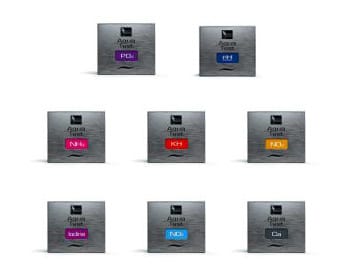Below are some general guidelines for saltwater aquarium water testing. Please note these are only a general guidelines and not absolutes. Every aquarium is different and there are always exceptions to the rule.
Basic Aquarium Water Testing
Ammonia (NH3 – toxic): Zero (undetectable)
Nitrite (NO2 – non-toxic): Zero (undetectable)
Nitrate (NO3 – toxic): Zero (undetectable) is ideal, but less than 20ppm is generally acceptable.
pH: 8.0 to 8.4 is generally acceptable. pH will fluctuate based on carbon dioxide and oxygen levels in your home and aquarium. pH will always be lower in the morning and higher in the evening, so remember to do aquarium water testing at the same time of the day. Carbon dioxide causes pH to fall and oxygen causes pH to rise.

Temperature: 74 to 82 degrees is generally acceptable with average aquarist aiming for 78 degrees. Once the temperature is in the appropriate range, the next step is to maintain a stable temperature with as little fluctuations as possible. A combination of Fans, Chillers and Heaters can be used to control aquarium temperature.
Salinity: Specific Gravity 1.020 to 1.026 is generally acceptable with the average reef hobbyist targeting 1.024 to 1.025. Once the salinity is in the appropriate range, the next step is to maintain a stable salinity with only minor fluctuations. An auto-top device can be used to reduce salinity swings due to evaporation. Remember to use a calibrated Refractometer for accurate results.
Advanced Aquarium Water Testing
Phosphate Test Kit: Zero (undetectable) is ideal. A saltwater fish tank with elevated phosphates is usually caused by overfeeding or using tap water rather than Reverse Osmosis water. Please note, a saltwater aquarium with lots of algae growth can have zero phosphates, it’s just that the phosphate is being absorbed immediate by the algae.
Calcium: 370 to 450ppm is generally acceptable. For most aquarists keeping soft corals and some LPS corals, weekly water changes is enough to maintain calcium. At 370ppm scientists believe that coral growth is maximized and any greater amount will have no effect on enhancing coral growth. It is more important to maintain a stable calcium level rather than an elevated calcium level.
Alkalinity: 2.5 to 4.3 meq/L or 7 to 12 dKH. (meq/L can be converted to dKH by multiplying meq/L by 2.8) The ocean has an alkalinity of approximately 7 dKH, but most home aquariums are maintained at elevated levels to help promote coraline algae. Some research shows that some SPS corals like Acropora may prefer an alkalinity closer to natural seawater, while soft corals may prefer a higher alkalinity near 12 dKH. While this research is debatable, most hobbyists can agree that it is important to maintain a stable alkalinity level.
Magnesium: 1350ppm is generally ideal. Sometimes hobbyists find it difficult to maintain balanced levels of Calcium and Alkalinity because they need to increase Magnesium.
These are only general guidelines! Every saltwater aquarium is different and you may find great success and failure while maintaining these water parameters. In general, most salt mixes will mix to appropriate levels, but a few adjustments may be required. Remember to use high quality aquarium test kits. Using test kits from most general pet stores will provide you with inaccurate results.
